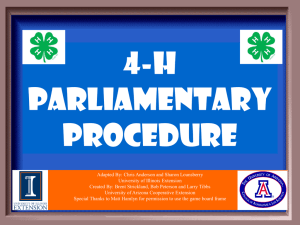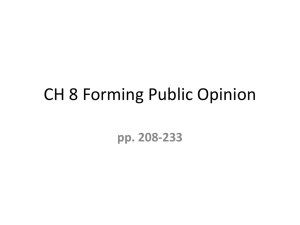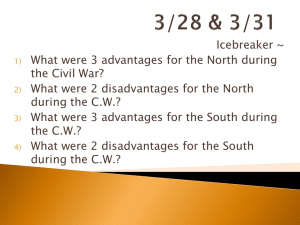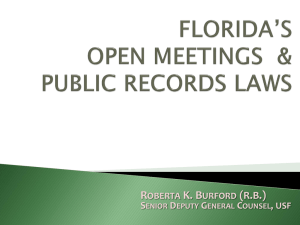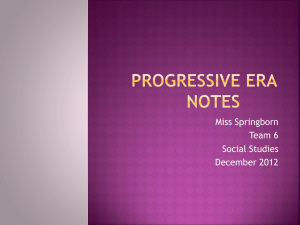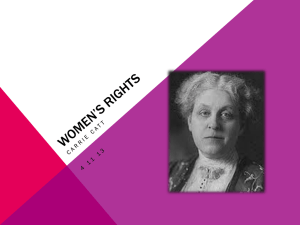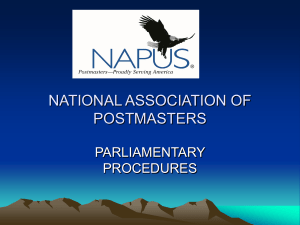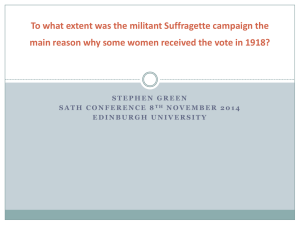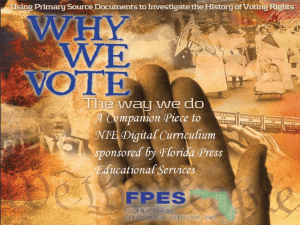Restore the Vote - Palm Beach Chapter
advertisement
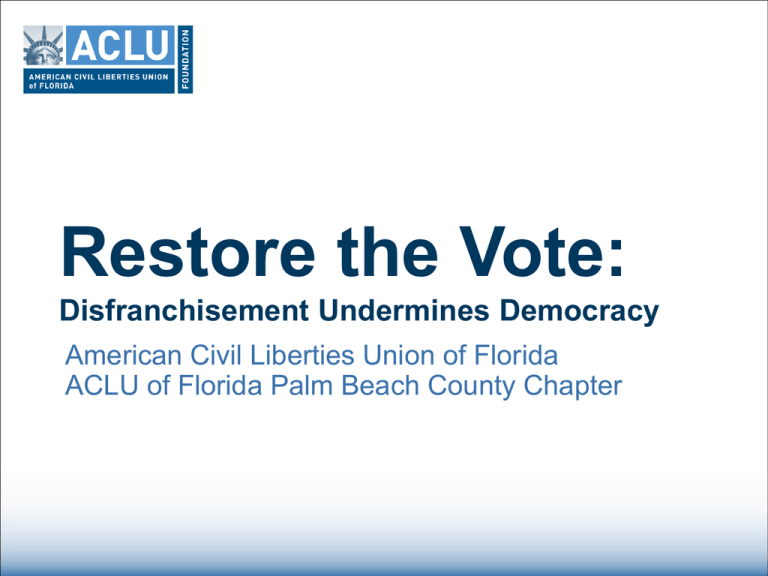
Restore the Vote: Disfranchisement Undermines Democracy American Civil Liberties Union of Florida ACLU of Florida Palm Beach County Chapter Restore the Vote National Overview • Over 5.8 million people in the U.S. cannot vote because of a felony conviction • Felon disfranchisement laws disproportionately affect minorities • Disfranchisement varies widely by state. States fall into one of 6 types, from full enfranchisement to permanent disfranchisement • Overall, the U.S. has the most complex and punitive disfranchisement system in the world 2 Restore the Vote Disfranchisement is Increasing 3 Florida Overview Restore the Vote Over 1.3 million people in Florida cannot vote because of a felony conviction 900,000 of these Floridians have completed their terms of incarceration and/or supervision Communities of color in Florida are disproportionately affected: • Close to 19% of the voting age population of African-American Floridians are disfranchised Only 420 Floridians had their rights restored over 2011-2012 4 Florida’s Lead Uncontested 5 Restore the Vote The 5 top states by number disfranchised (in thousands) The 5 top states by % of votingage population disfranchised Over 25% of all disfranchised Americans reside in Florida One in ten Floridians can’t vote Voting by Felons Across the States Restore the Vote UNRESTRICTED: 2 states, ME & VT, allow voting even during incarceration DISFRANCHISEMENT ENDS AFTER RELEASE: 13 states and D.C. DISFRANCHISEMENT ENDS AFTER PAROLE: 5 states DISFRANCHISEMENT ENDS AFTER PROBATION: 21 states CIRCUMSTANTIAL: 5 states LIFETIME BAN, BUT INDIVIDUAL RESTORATION PETITIONS ALLOWED: 4 states (Florida, Virginia, Kentucky and Iowa) 6 Claimed Justification Restore the Vote “Felons have, by definition, knowingly and intentionally violated the laws of society…. [Disfranchisement] gives felons the opportunity — and an incentive — to prove they are deserving of exercising their right to vote…Such an incentive can only encourage their rehabilitation — it should not be a ‘freebie,’ restored automatically as though it has no value at all.” Hans von Spakovsky for The Heritage Foundation 7 The Argument Against—Part 1 Restore the Vote “Whenever we tell citizens who have paid their debts and rejoined their communities that they are not entitled to take part in the democratic process, we fall short of the bedrock promise – of equal opportunity and equal justice – that has always served as the foundation of our legal system. So it’s time to renew our commitment – here and now – to the notion that the free exercise of our fundamental rights should never be subject to politics, or geography, or the lingering effects of flawed and unjust policies.” U.S. Attorney General Eric Holder 8 The Argument Against—Part 2 Restore the Vote “As the evidence has shown…permanent exclusion from the civic community does not advance any objective of our criminal justice system. It has never been shown to prevent new crimes or deter future misconduct. And there’s no indication that those who have completed their sentences are more likely to commit electoral crimes of any type – or even to vote against prolaw enforcement candidates. “ U.S. Attorney General Eric Holder 9 Historical Rationale: Jim Crow Restore the Vote “To ensure that disfranchisement was complete [after the Civil War], [southern] states also tailored laws that disqualified people convicted of criminal offenses to crimes thought to be committed by the newly-freed slaves but not by whites.” NAACP: Defending Democracy, p. 6 10 Jim Crow—Part 2 Restore the Vote “The resulting system of unequal enforcement – and discriminatory application of the law – led to a situation, in 1890, where ninety percent of the Southern prison population was black. And those swept up in this system too often had their rights rescinded, their dignity diminished, and the full measure of their citizenship revoked for the rest of their lives. They could not vote.” U.S. Attorney General Eric Holder 11 Felonies in Florida Restore the Vote About ½ of felonies are non-violent crimes, about ½ of non-violent felonies are for drug possession or trafficking Despite roughly equal usage rates, drug charges fall more heavily on minorities than on whites (see aclu.org/marijuana for more info), meaning the “War on Drugs” is taking a toll on minority communities 12 Felonies in Florida Restore the Vote Should these Florida felonies merit lifetime loss of democratic rights? Counterfeit or alter a state lottery ticket [24.118(3)(a)] Molest a stone crab trap, line or buoy [370.13(4)(g)] Trespass on posted commercial horticultural property [810.090(2)(e)] Possess hydrocodone [893.13(6)(a)] 13 Felon Disfranchisement in Florida Restore the Vote ARTICLE VI, SECTION 4 OF FL. CONSTITUTION “No person convicted of a felony or adjudicated to be mentally incompetent, shall be qualified to vote or hold office until restoration of civil rights or removal of disability.” ARTICLE IV, SECTION 8A OF FL. CONSTITUTION “ …the governor may… with the approval of two members of the cabinet… restore civil rights…” 14 Felon Disfranchisement in Florida Restore the Vote Restoration of voting rights comes through “executive clemency.” Florida’s Board of Executive Clemency is made up of the Governor and the Cabinet: Attorney General, Chief Financial Officer, and Agriculture Commissioner. The Parole Commission serves as the investigative arm of the board. Decisions by the Clemency Board have neither legislative oversight nor judicial review. Clemency Board can change rules by majority vote. 15 Reforms and Backlash Restore the Vote Following aggressive lobbying from the ACLU of Florida and other groups, reforms were passed in 2007 that streamlined the process for rights restoration and resulted in an unprecedented number of Floridians having their voting rights restored: 151,823 had rights restored in 2008 24,954 had rights restored in 2009 5,718 had rights restored in 2010 16 Reforms and Backlash Restore the Vote Those reforms were rolled back and new restrictions were put in place in 2011 shortly after the inauguration of the new governor and cabinet: 78 342 17 had rights restored in 2011 had rights restored in 2012 The 2011 Restrictions WITHOUT A HEARING- those with non-violent and nonsexual offender status must: 1. AFTER completion of sentence & conditions (probation & restitution), wait 5 years before being eligible to apply. 2. Remain arrest and conviction free for entire 5 years. 3. Submit application, attaching certified court documents for each felony conviction: Charging Document, Judgment, and Sentence Order 18 Restore the Vote WITH A HEARING – Those who have been convicted of a “more serious offense” 1. AFTER completion of sentence & conditions, wait 7 years to be eligible to apply. 2. Have no arrests or convictions in waiting period. 3. Must submit application with certified court documents for each felony conviction 4. Case MUST be heard by the Executive Clemency Board 5. Executive order must be signed by the governor plus two members of the Executive Clemency Board 6. Certificate will be sent to last known address The 2011 Restrictions Restore the Vote When an ex-felon completes the application process, the Parole Commission reviews the case and either grants or withholds restoration of rights. Ex-felons will be sent a letter and certificate to last known address The Parole Commission maintains a searchable list of those with rights restored at https://fpcweb.fpc.state.fl.us/ Those with right restored can print a certificate from this website 19 Why Restore the Vote - Part 1 Restore the Vote The fundamental right to vote is the backbone of our democracy, and a person shouldn’t lose that right based on a bad decision from his or her past. “…[B]ecause the right to vote ‘is of the essence of a democratic society, and any restrictions on that right strike at the heart of representative government’ …voting is a ‘fundamental’ right.” - Justice Thurgood Marshall (joined by Brennan), in dissent from Richardson v Ramirez 20 Why Restore the Vote - Part 2 Restore the Vote Voting helps former felons reintegrate into society, reducing taxpayer costs and making our communities safer. Data show that voting ex-felons are less likely to reoffend than non-voting ex-felons In Florida overall recidivism rate is 33%, but among reenfranchised ex-felons the rate is only 11%. That’s one third as high, as Attorney General Holder noted. 88% of incarcerated people in Florida will be released to their communities. Prison costs about $18,000 per prisoner per year 21 Why Restore the Vote - Part 3 Restore the Vote Felon disfranchisement is anti-democracy, and Florida’s lifetime disfranchisement system is the largest voter suppression system in the U.S. Florida’s system of lifetime disfranchisement is a stain from our state’s shameful Jim Crow past and continues to weaken the voices of racial minorities in our democracy. 80% of Americans support voting rights for people with past felony convictions. 22 ACLU’s Recommendations 1. Automatic restoration of civil rights (RCR) 2. Remove waiting periods 3. Remove restitution pre-conditions 4. Remove certified document requirement 5. Increase transparency in RCR process 23 Restore the Vote What Can I Do? Restore the Vote 1. Get groups you support to join the Florida Rights Restoration Coalition (FRRC). 2. Join the thousands of Floridians who have signed the petition to restore voting rights in Florida. 3. Ask candidates and elected officials to support automatic rights restoration. 24 What Can I Do? Restore the Vote 4. Support measures like Rights Restoration Fairs that reintegrate former felons into their communities and provide opportunities to work. 5. Support ballot initiatives to change the Florida Constitution to end lifetime felon disfranchisement. 25 Restore the Vote For more information, contact: acluflonline@aclufl.org or read more on our website at: www.aclufl.org 26 Because Freedom Can’t Protect Itself www.aclufl.org

